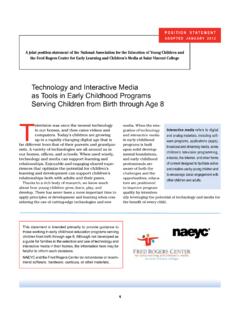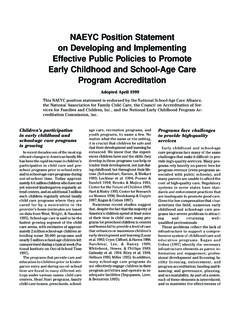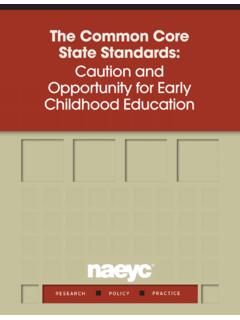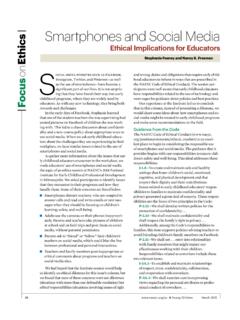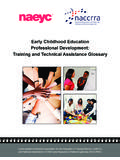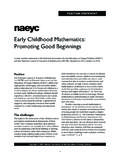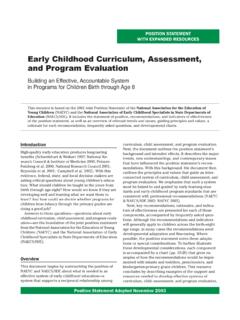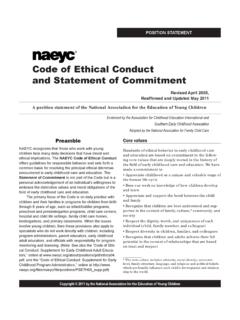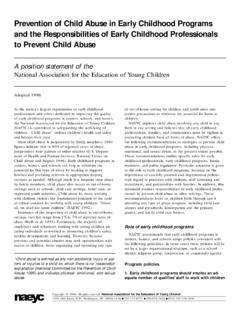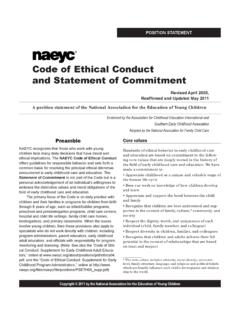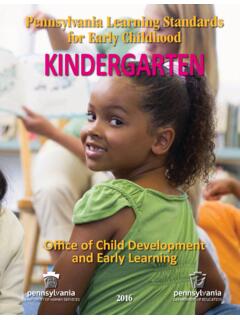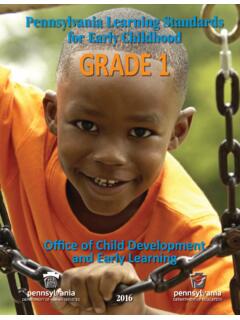Transcription of Advancing Equity in Early Childhood Education
1 Advancing Equity in Early Childhood EducationNational Association for the Education of Young ChildrenPosition StatementAdopted by the NAEYC National Governing Board April 2019 All children have the right to equitable learning opportunities that help them achieve their full potential as engaged learners and valued members of society. Thus, all Early Childhood educators have a professional obligation to advance Equity . They can do this best when they are effectively supported by the Early learning settings in which they work and when they and their wider communities embrace diversity and full inclusion as strengths, uphold fundamental principles of fairness and justice, and work to eliminate structural inequities that limit equitable learning en Espa ol: #EquityinECENAEYC Position StatementPermissions NAEYC accepts requests for limited use of our copyrighted material.
2 For permission to reprint, adapt, translate, or otherwise reuse and repurpose content from the final published document, review our guidelines at Equity in Early Childhood Education : A Position Statement of the National Association for the Education of Young Children. Copyright 2019 by the National Association for the Education of Young Children. All rights Advancing Equity in Early Childhood Education 3 Purpose 5 Position 6 Recommendations for Everyone 7 Recommendations for Early Childhood EducatorsCreate a Caring, Equitable Community of Engaged LearnersEstablish Reciprocal Relationships with FamiliesObserve, Document, and Assess Children s Learning and DevelopmentAdvocate on Behalf of Young Children, Families, and the Early Childhood Profession 9 Recommendations for Administrators of Schools, Centers, Family Child Care Homes.
3 And Other Early Childhood Education Settings 10 Recommendations for those Facilitating Educator Preparation and Professional Development 11 Recommendations for Public Policymakers 12 The Evidence for this Position Statement Principles of Child Development and Learning The Social-Cultural Context of Child Development and Learning 16 Conclusion Acknowledgements 17 Definitions of Key Terms 19 EndnotesA POSITION STATEMENT OF THE NATIONAL ASSOCIATION FOR THE Education OF YOUNG CHILDREN | 3 PurposeThis position statement is one of five foundational documents NAEYC has developed in collaboration with the Early Childhood profession. With its specific focus on Advancing Equity in Early Childhood Education , this statement complements and supports the other foundational documents that (1) define developmentally appropriate practice, (2) set professional standards and competencies for Early Childhood educators , (3) define the profession s code of ethics, and (4) outline standards for Early learning foundational statements are grounded in NAEYC s core values that emphasize diversity and inclusion and that respect the dignity and worth of each individual.
4 The statements are built upon a growing body of research and professional knowledge that underscores the complex and critical ways in which Early Childhood educators promote Early learning through their relationships with children, families, and colleagues that are embedded in a broader societal context of inequities in which implicit and explicit bias are Appropriate Practice (DAP)Professional Standards and Competencies for Early Childhood EducatorsCode of Ethical ConductAdvancing Equity in Early Childhood EducationNAEYC Early Childhood Program StandardsNAEYC s Foundational Documents4 | Advancing Equity IN Early Childhood EDUCATIONA dvancing Equity in Early Childhood Education requires understanding this broader societal context, these biases, and the ways in which historical and current inequities have shaped the profession, as they have shaped our nation.
5 The biases we refer to here are based on race, class, culture, gender, sexual orientation, ability and disability, language, national origin, indigenous heritage, religion, and other identities. They are rooted in our nation s social, political, economic, and educational structures. Precisely because these biases are both individual and institutional, addressing structural inequities requires attention to both interpersonal dynamics the day-to-day relationships and interactions at the core of Early Childhood Education practice and systemic influences the uneven distribution of power and privilege inherent in public and private systems nationwide, including in Early Childhood single individual, leader, or organization has all the answers related to Equity . NAEYC presents this statement after significant reflection and with humility and awareness of our own history and limitations, in keeping with our core belief in continuous quality improvement.
6 In this statement, we share our commitment to becoming a more diverse, high-performing, and inclusive organization serving a more diverse, high-performing, and inclusive profession. Our goal is to nurture a more diverse and inclusive generation of young children who thrive through their experiences of equitable learning opportunities in Early learning programs. We commit both individually and collectively to continuous learning based on personally reflecting on how our beliefs and actions have been shaped by our experiences of the systems of privilege and oppression in which we operate and based on respectfully listening to others perspectives. Although this statement may be useful to an international audience, we caution that it is based on the context of Early Childhood Education within the United States. In the spirit of learning we have included a list of definitions of terms, many of which are referenced in the document, as well as others that are often used in Equity discussions.
7 These definitions begin on page position statement outlines steps needed to 1. provide high-quality Early learning programs that build on each child s unique individual and family strengths, cultural background, language(s), abilities, and experiences and 2. eliminate differences in educational outcomes as a result of who children are, where they live, and what resources their families have. The document begins with the statement of NAEYC s position regarding the importance of Equity in Early Childhood Education . It then provides recommendations for Advancing Equity , beginning with recommendations for self-reflection that apply to everyone. Specific recommendations are also provided for Early Childhood educators ; administrators of schools, centers, family child care homes, and other Early Childhood Education settings; facilitators of educator preparation and professional development in higher Education and other spheres; and public policymakers.
8 The recommendations are followed by a synthesis of current Early Childhood Education research through the lenses of Equity and NAEYC core values; this discussion of evidence identifies principles of child development and learning and how they are impacted by social-cultural continuedA POSITION STATEMENT OF THE NATIONAL ASSOCIATION FOR THE Education OF YOUNG CHILDREN | 5 PositionAll children have the right to equitable learning opportunities that enable them to achieve their full potential as engaged learners and valued members of the right to equitable learning opportunities requires recognizing and dismantling the systems of bias that accord privilege to some and are unjust to others. Advancing the full inclusion of all individuals across all social identities will take sustained efforts far beyond those of Early Childhood educators alone.
9 Early Childhood educators , however, have a unique opportunity and obligation to advance Equity . With the support of the Early Education system as a whole, they can create Early learning environments that equitably distribute learning opportunities by helping all children experience responsive interactions that nurture their full range of social, emotional, cognitive, physical, and linguistic abilities; that reflect and model fundamental principles of fairness and justice; and that help them accomplish the goals of anti-bias Education . Each child will demonstrate self-awareness, confidence, family pride, and positive social identities; express comfort and joy with human diversity, use accurate language for human differences, and form deep, caring human connections across diverse backgrounds; increasingly recognize and have language to describe unfairness (injustice) and understand that unfairness hurts; have the will and the skills to act, with others or alone, against prejudice and/or discriminatory Childhood Education settings including centers, family child care homes, and schools are often among children s first communities beyond their families.
10 These settings offer important contexts for children s learning. They should be environments in which children learn that they are valued by others, learn how to treat others with fairness and respect, and learn how to embrace human differences rather than ignore or fear Early Childhood educators use inclusive teaching approaches, they demonstrate that they respect diversity and value all children s strengths. Early Childhood educators can model humility and a willingness to learn by being accountable for any negative impacts of their own biases on their interactions with children and their families. They can work to ensure that all children have equitable access to the learning environment, the materials, and the adult child and child child interactions that help children thrive. Early Childhood educators can recognize and support each child s unique strengths, seeking through personal and collective reflection to avoid biases explicit or implicit that may affect their decision making related to effectively advance Equity and embrace diversity and full inclusion, Early Childhood educators need work settings that also embrace these goals not only for the children and families served but also for the educators themselves.
